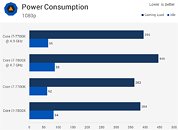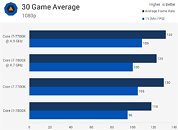Tuesday, July 18th 2017

Benchmarks Find Intel Core i7-7700K Better Than i7-7800X for Gaming
Over at Techspot, Steven Walton managed to get a hold of Intel's new six-core, 12-thread Core i7-7800X CPU, and chose to take it for a spin over a levy of gaming benchmarks. The results don't bode particularly well for Intel's new top i7 offering, though: it is soundly beat by its smaller, svelter brother in virtually all gaming tasks.
Out-of-the-box results are somewhat in line with what we would expect: the Core i7-7700K does bring about a base clock increased by 700 MHz compared to the i7-7800X (4.2 GHz vs 3.5 GHz), and has a higher boost clock to boot (4.5 GHz vs 4 GHz.) And as we've seen over and over again, including with Intel rival AMD's Ryzen offerings, frequency usually trumps core count when it comes to performance when applications are exposed more than four cores. And this leads to Walton's results: the Core i7 7700K is still king in pure FPS terms, coming in with a much more attractive proposition than the 7800X in both minimum and maximum FPS, as well as power consumption.Now, to be fair, most of us were probably expecting that: consumer application optimization for high core-count processors (if we can actually call a six-core a high core-count processor in a soon to be Threadripper-infused world, but I digress) is sorely lacking. However, what really paints Intel's i7-7800X in a bad light is that its performance continues to be lacking even when it has a frequency advantage over the 7700K. As you can see in the performance metrics, a Core 17-7800X overclocked to 4.7 GHz (with a 500 MHz advantage over stock clocks of the 7700K and 200 MHz over its Boost clock) still performs slower than it. The stock 7700K has 5% higher minimum and maximum framerates than the 7800X, despite being clocked lower, having a ridiculously lower amount of L2 cache, and having about the same total L3 cache (which actually results in an about 30% lower available L3 cache per core.) And these lower frame rates are delivered with a 41% higher idle power consumption, and 23% higher gaming power consumption. Check the source link for some detailed benchmarks. As for all this, it seems that while Intel likes to take digs on AMD for their "glued-together" desktop dies repurposed for servers, Intel's 7800X, which has its cache hierarchy and core interconnect re-architected for servers, may be little more than a repurposed server CPU for the desktop crowds...
Source:
Techspot
Out-of-the-box results are somewhat in line with what we would expect: the Core i7-7700K does bring about a base clock increased by 700 MHz compared to the i7-7800X (4.2 GHz vs 3.5 GHz), and has a higher boost clock to boot (4.5 GHz vs 4 GHz.) And as we've seen over and over again, including with Intel rival AMD's Ryzen offerings, frequency usually trumps core count when it comes to performance when applications are exposed more than four cores. And this leads to Walton's results: the Core i7 7700K is still king in pure FPS terms, coming in with a much more attractive proposition than the 7800X in both minimum and maximum FPS, as well as power consumption.Now, to be fair, most of us were probably expecting that: consumer application optimization for high core-count processors (if we can actually call a six-core a high core-count processor in a soon to be Threadripper-infused world, but I digress) is sorely lacking. However, what really paints Intel's i7-7800X in a bad light is that its performance continues to be lacking even when it has a frequency advantage over the 7700K. As you can see in the performance metrics, a Core 17-7800X overclocked to 4.7 GHz (with a 500 MHz advantage over stock clocks of the 7700K and 200 MHz over its Boost clock) still performs slower than it. The stock 7700K has 5% higher minimum and maximum framerates than the 7800X, despite being clocked lower, having a ridiculously lower amount of L2 cache, and having about the same total L3 cache (which actually results in an about 30% lower available L3 cache per core.) And these lower frame rates are delivered with a 41% higher idle power consumption, and 23% higher gaming power consumption. Check the source link for some detailed benchmarks. As for all this, it seems that while Intel likes to take digs on AMD for their "glued-together" desktop dies repurposed for servers, Intel's 7800X, which has its cache hierarchy and core interconnect re-architected for servers, may be little more than a repurposed server CPU for the desktop crowds...


136 Comments on Benchmarks Find Intel Core i7-7700K Better Than i7-7800X for Gaming
Step back consider your relevance to op and also consider that what you play and how well it plays on your shit ,in your consideration means nothing to this debate i Can play shit to a satisfactory level on a tablet pc ,And....???
Back on topic this is still fail , nothing bar a bios wizard or harsh oc is fixing this, people are talking about overclocking its mesh to compete, wouldn't intel have done that though if they can.
6 Core + in 2017.
6 Core is the new sweet spot, I use easy 40-70% of my CPU 6900k @ 4.5Ghz, the system is running alot more smooth overall on my 8 core, than my 7700k.
Some said that Ryzen is a bottleneck for titan. What a crap. Same as 7800x is a bottleneck. Just because they have less FPS. That person didn't mentioned that the 7700k runs at 99% utilization while the 7800x or Ryzen hit half of 7700k's or something like that. this 7700k may have the highest FPS now. it will end up down in the dumps pretty soon especially if Intel decided to go more cores now.
Regarding the PCI lanes remember it is 2.0 VS 3.0 so even a 28 lane CPU has more bandwidth than an old 40lane..
and you have 24lanes on the chipset vs 8 on x99 that are linked with 8GT/s where x99 had "only" 5GT/s
so i dont see the big issue regarding pci lanes
Its all about the Min FPS more so then the Max and if it feels smooth, even some games at 30FPS feel smooth.
The change in L2/L3 benefits cloud computing and in all fairness, there isn't much to see in the Anandtech article at all, beyond AVX512 being the most important reason to jump on it if you feel the need to. So far, this topic was about concluding that the changes don't really benefit a lot of typical workloads at all, contrary in fact. And the bottom line still is that 80% of the changes we see here is out of necessity, not because Core will become so much better than it was. (the mesh is a good example - needed because core counts go up and a ringbus alone wont cut it)
So there you go, any more complaints? Skylake-X still is a shit release and still is part of a dreadful platform called X299 and as far as its changes, what I've said is simply true. Its the same shit in a new package with some bandaids to keep it going, the E changed to an X to make it seem like it goes faster.
Now, I'm looking forward to your sensible contribution to this topic, as you seem to have a lot to offer so far, but got stuck at 'these look fishy' without really talking about any of the charts in this very topic. Cool.
That said, I have no interrest in HEDT.
I'm probably going CFL 6C/12T. Ryzen hurts my fps too much. Ryzen gaming performance is all over the place. Sometimes even Pentium/i3 beats Ryzen...
The joys of a stagnant duopoly.
So who exactly do you think will offer Intel and AMD the competition? ARM? VIA? Someone else? Because noone besides Intel and AMD holds the x86 license. If someone even so much as tried to make a x86 CPU without a license they would be sued to bankrupt.